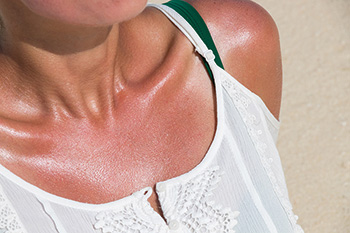Got sunburned? Here’s what to do
 Whether you’re working outdoors or enjoying the holiday weekend, if you’re not careful, you could get burned. The Skin Cancer Foundation offers the following advice for dealing with a bad sunburn:
Whether you’re working outdoors or enjoying the holiday weekend, if you’re not careful, you could get burned. The Skin Cancer Foundation offers the following advice for dealing with a bad sunburn:
1. Act fast to cool it down
If you’re near a cold pool, lake or ocean, take a quick dip to cool your skin, but only for a few seconds so you don’t prolong your exposure. Then cover up and get out of the sun immediately. Continue to cool the burn with cold compresses. You can use ice to make ice water for a cold compress, but don’t apply ice directly to the sunburn. Or take a cool shower or bath, but not for too long, which can be drying, and avoid harsh soap, which might irritate the skin even more.
2. Moisturize while skin is damp
While skin is still damp, use a gentle moisturizing lotion (but not petroleum or oil-based ointments, which may trap the heat and make the burn worse). Repeat to keep burned or peeling skin moist over the next few days.
3. Decrease the inflammation
At the first sign of sunburn, taking a nonsteroidal anti-inflammatory drug (NSAID), such as ibuprofen, naproxen or aspirin, can help with discomfort and inflammation. You can continue with the NSAIDs as directed till the burn feels better. You can also use a one percent over-the-counter cortisone cream as directed for a few days to help calm redness and swelling. Aloe vera may also soothe mild burns and is generally considered safe. Wear loose, soft, breathable clothing to avoid further skin irritation, and stay out of the sun.
4. Replenish your fluids
Burns draw fluid to the skin’s surface and away from the rest of the body, so you may become dehydrated. It’s important to rehydrate by drinking extra liquids, including water and sports drinks that help to replenish electrolytes, immediately and while your skin heals.
5. See a doctor if …
You should seek medical help if you or a child has severe blistering over a large portion of the body, has a fever and chills, or is woozy or confused. Don’t scratch or pop blisters, which can lead to infection. Signs of infection include red streaks or oozing pus.
Repeat sunburns put you at a substantial risk for skin cancer and premature skin aging. For more information, visit the Skin Cancer Foundation’s Prevention Handbook at www.skincancer.org/prevention/graphics/handbook.



Leave a Reply